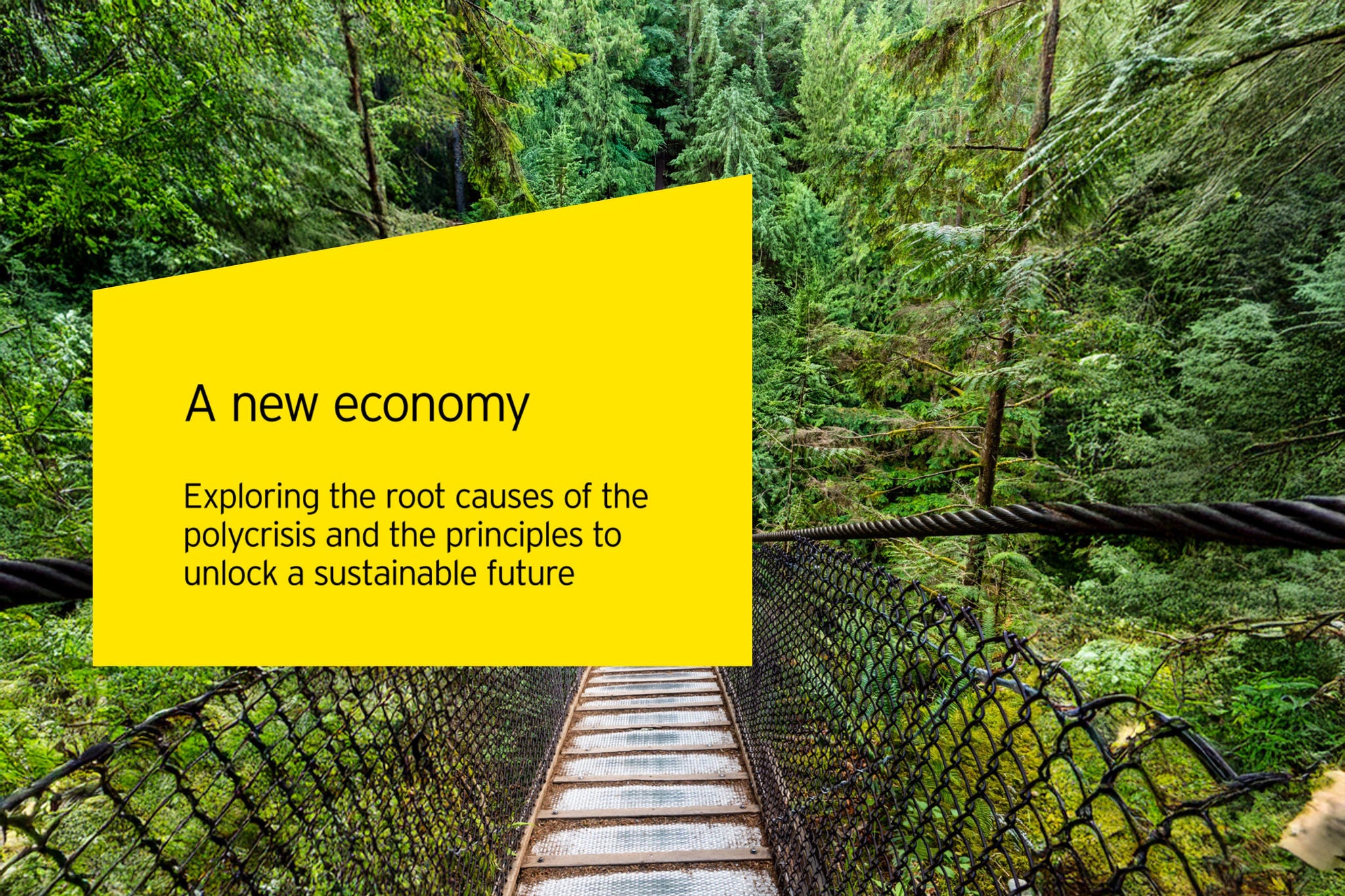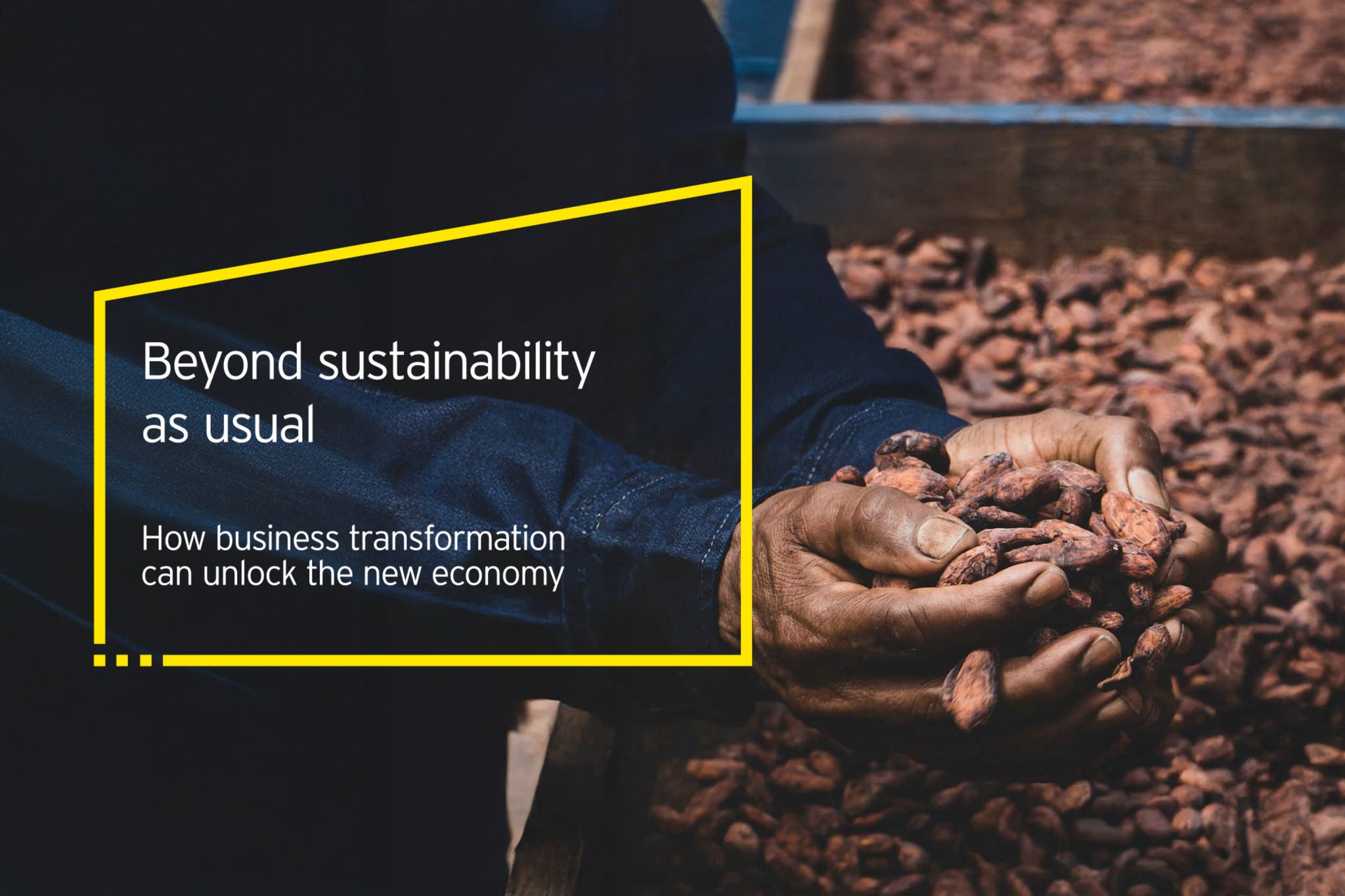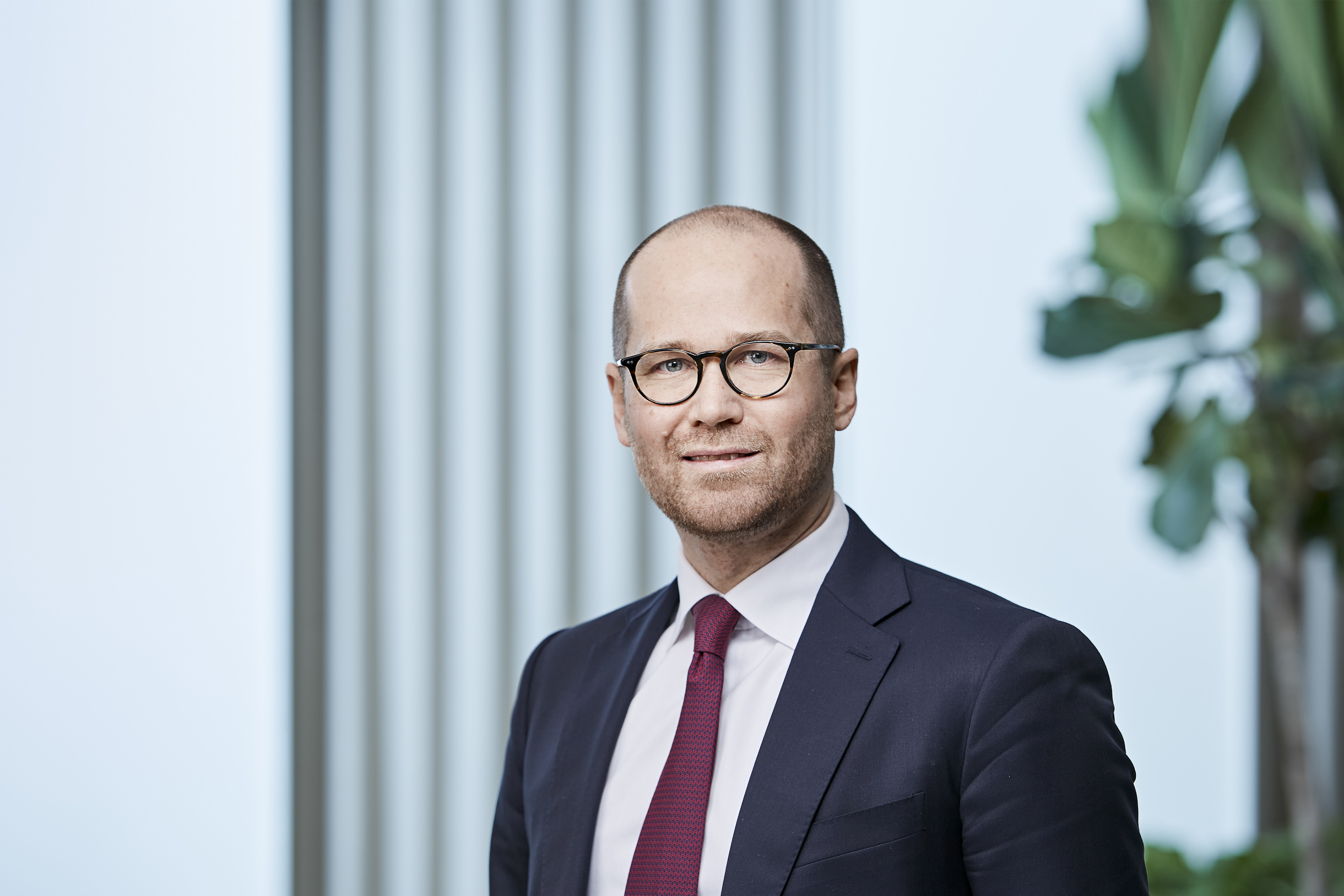EY refers to the global organization, and may refer to one or more, of the member firms of Ernst & Young Global Limited, each of which is a separate legal entity. Ernst & Young Global Limited, a UK company limited by guarantee, does not provide services to clients.
New economy report from EY: Sustainable business transformation
Old approaches cannot solve today’s polycrisis. It’s time for bold thinking and a new economy where people, planet and business thrive.
Get in touch with us to reimagine your sustainability strategy for the new economy
Imagine walking through a museum of obsolete tools — floppy disks, fax machines, dusty ledgers. Useful in their time, sure, but irrelevant now. So, why are we still using outdated economic models to tackle today’s deeply interconnected sustainability challenges?
These are precisely the kinds of questions the New Economy Unit (NEU) — a research and insights team within EY teams’ Global Climate Change and Sustainability Services (CCaSS) practice — has been established to explore.
The NEU published a bold report: A new economy: Exploring the root causes of the polycrisis and the principles to unlock a sustainable future. The report calls for a long-term transformation toward a regenerative economy, grounded in five key principles to ensure sustainable future outcomes. While global crises — such as trade barriers, wars, geopolitical instability, ecological challenges and social crises — are intensifying short-term pressures, the report highlights that these challenges also heighten the need for a more foundational, long-term shift.
The new economy thinking began with a provocative and timely question: What if sustainability can’t simply be retrofitted into a system that is fundamentally unsustainable? The challenge today is not whether change is needed, but whether we have the imagination — and the courage — to design something better.
An economic system in polycrisis
Despite decades of progress in health, education and global development, the foundations of our current economic model are showing signs of strain. Already, six of nine planetary boundaries — the critical thresholds beyond which Earth’s life-support systems become unstable — have been breached.
The new economy report from NEU pinpoints six deeply interlinked systemic flaws at the heart of today’s crises:
- Unsustainable growth: Pursuit of GDP at the expense of ecological stability and social cohesion.
- Overconsumption: Resource use in high-income regions that far exceeds planetary limits.
- Linear economy: A cradle-to-grave model that wastes materials and erodes resilience.
- Financial capital myopia: Overvaluation of monetary returns at the cost of natural and social capital.
- Short-termism: Structural and cognitive biases that delay transformative action.
- Siloed thinking: Failure to connect the dots across sectors, systems and disciplines.
From regulatory disruption to rising geopolitical risk, energy shocks and ecological tipping points, the world is no longer facing a crisis. We’re confronting what experts now call a polycrisis economy — multiple, interconnected breakdowns in the environment, society and economy that reinforce each other in unpredictable ways with six interconnected systematic flaws (depicted in the figure below).
The five principles of the new economy
What if we could design an economy that creates value within planetary boundaries, distributes it more fairly and prioritizes resilience over rapid extraction? The new economy report outlines five foundational principles to guide that transition:
- Sufficiency: Ensuring enough for all — not endless consumption for some.
- Circularity: Closing resource loops and regenerating ecosystems.
- Systems thinking: Recognizing the interdependence of people, planet and markets.
- Redefining value: Moving beyond financial returns to multi-capital prosperity.
- Equity and justice: Making sure the transition benefits everyone, not just early adopters.
But how can businesses translate these principles into strategy, especially in a world consumed by near-term pressures?
The forces driving systemic risk have only intensified. Yet, with these challenges come unprecedented opportunities for bold leadership.
The new economy principles are about thinking beyond current paradigms. But today, we also must apply this thinking within a volatile and challenging landscape. Businesses can’t wait for perfect conditions to adapt and transform.
Why the new economy principles matters — perhaps now more than ever
In today’s world of rising geopolitical tensions, regulatory uncertainty and disrupted supply chains, the principles outlined in the new economy report remain profoundly relevant — offering a long-term lens to navigate short-term shocks and avoid locking into unsustainable paths.
Pressures from regulatory shifts, trade barriers and supply chain risks have created an environment where resilience and short-term value protection often take precedence. Yet, this short-term focus should not come at the expense of long-term strategic thinking.
Regulatory instability, trade friction and supply chain risks demand long-term thinking. Embracing new economy principles enables businesses to thrive amid rapid change and seize emerging opportunities.
In a world where we see new level of conflicts, polarization and increased political instability, there is a need to manage risks and uncertainties both in near and longer term across scenarios. Amid increasing fragmentation in international cooperation on sustainability, strong regional leadership can help advance new economic thinking and drive sustainability policy-making in certain areas.
In Europe, there is increased focus on security, dependency and on the future of competitiveness. The European Union (EU) has expressed a strong need to boost Europe’s economic growth and competitiveness by closing the innovation gap, accelerating the energy transition, advancing decarbonization and strengthening security.
In addition, there is a focus on reducing consumption, increasing circularity, minimizing dependencies, and ensuring that no individuals or groups are left behind during the process. These priorities were articulated during the launch of EU’s Competitiveness Compass in January 2025 alongside the following recent initiatives:
- The Clean Industrial Deal sets out key measures to make decarbonization a growth driver for Europe — combining regulatory reform, industrial strategy and over €100 billion in investment to support energy resilience, circularity and competitiveness.
- The EU Omnibus package goes hand-in-hand with the Clean Industrial Deal and simplifies Corporate Sustainability Reporting Directive (CSRD), EU Taxonomy and Corporate Sustainability Due Diligence Directive (CSDDD) requirements — reducing reporting burdens to free up resources, so businesses can focus more on delivering real sustainability impact.
While these initiatives represent real progress and opportunities, businesses and nations must set targets and take necessary actions to deliver on the promises. As Europe moves toward a more incentive-driven approach to accelerate sustainable change, it's crucial to transition “in the right way.” The new economy framework’s holistic system design perspective provides a structured approach for analyzing the current economic situation and transitioning into a new economy.
Delaying change is not a viable strategy. Waiting for perfect conditions risks locking companies into outdated economic models, increasing risks and missing critical opportunities. Early movers access incentives and capital more easily, building resilience and long-term value for both planet and business.
Nordic businesses: willing, but wary?
Nordic businesses are often supported by a regulatory environment emphasizing sustainability and a strong social contract. However, the region faces dilemmas in balancing ongoing oil, gas, and mineral extraction with sustainability goals, as well as addressing challenges from a strong industrial sector and hard-to-abate industries that require massive investments to decarbonize. This highlights the need to innovate and prepare for the new economy, especially considering that the region experienced Earth Overshoot Day in April 2025.
The region is also active in producing renewables like solar, wind and hydropower, contributing to Europe’s energy security and affordability. Nevertheless, this must be balanced with the impact on nature and resource use. Businesses in the region have successfully begun transitioning their models toward a low-carbon future and digitalization, but this is just the beginning.
There is a need for business model innovation to meet evolving consumer expectations, supply constraints, shifting markets and regulatory forces, with technology serving as a transformation tool. While the Nordic region is known for being strong in scaling innovations, it has been falling behind in the innovation landscape. As we refocus our efforts to lead in innovation, it is crucial that we do so within the framework of a new economy system.
Companies need systems-thinking to prioritize energy efficiency, decarbonization and circularity, alongside a focus on long-term sustainability and redefining value for future competitiveness. For this to happen, ecosystem collaboration is essential.
Many Nordic companies are conceptually aligned with the new economy model, but topics like sufficiency remain sensitive. While business leaders remain committed to long-term sustainability goals, they are also navigating the current pressures of investor expectations and shareholder demands, which require careful balancing alongside their climate ambitions.
From EY teams’ perspective, the Nordic experience highlights the need for stronger alignment between boards and management on sustainability as a strategic priority. Those that embed it deeply into decision-making are better positioned to unlock resilience, innovate ahead of market shifts and build lasting value. Clearly showcasing the ROI of sustainability investments and integrating them into business strategies are key to ensuring relevance, prioritization and avoiding goal conflicts.
How EY teams can help: turning vision into scalable action
The new economy report from EY presents more than a framework — it’s a north star for bold leaders ready to shape the future. What’s needed now is courageous leadership, informed by science and driven by action.
The second report from the NEU, “Beyond sustainability as usual”, complements the new economy report and focuses on practical ways in which business transformation can unlock the new economy, with powerful case study examples.
Here’s where to begin:
- Mobilize around a long-term vision. What will your business model look like in 2050? Strategy must stretch beyond quarterly results and 2030 goals — and start changing now.
- Start small, scale with intent. Pilots are useful only if they ladder up to a broader transformation agenda. Sustainability must move from the periphery to the core of business design.
- Use your influence. No company can do this alone — but coalitions of committed leaders can. Leverage your platform to create momentum across your sector and supply chain.
- Mainstream the new economy. Mainstream the new economy principles by shifting the narrative, as perception is often the biggest barrier to progress. However, this shift must be integrated into corporate governance, targets and incentives to drive meaningful change.
With more than 20 years of experience and a full spectrum of sustainability services, EY teams support businesses in reimagining value chains, aligning boards and transforming ambition into action. We believe a better future is possible — one where business, people and planet thrive. A future built by brave thinkers driving action for a new economy, grounded in science, powered by data and technology, and delivering measurable impact.
Let’s not retrofit sustainability into a system unsustainable by design. Let’s design something better — together.
Explore the root causes of the polycrisis and the principles to unlock a sustainable future
Get in touch with us to reimagine your sustainability strategy for the new economy






